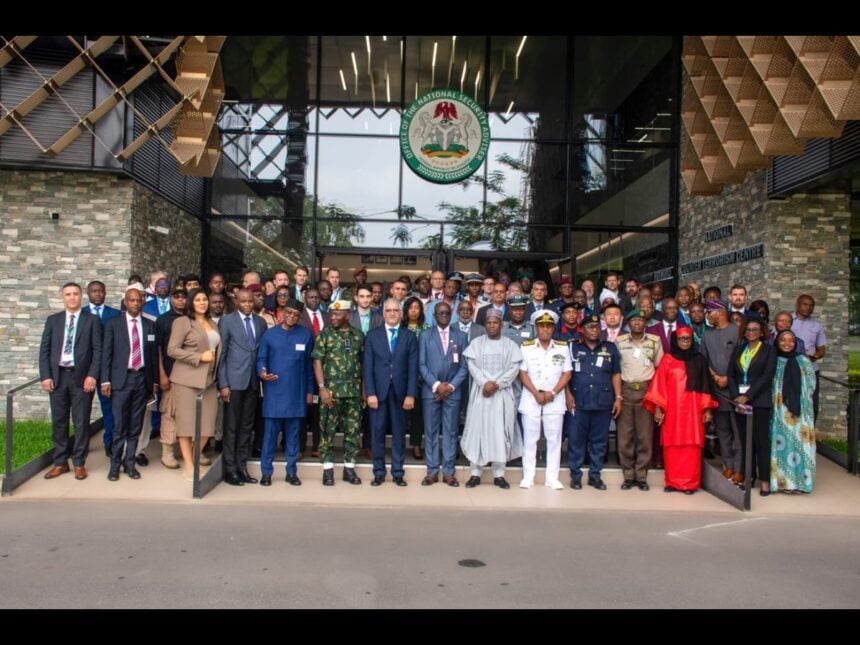The National Security Adviser (NSA), Mallam Nuhu Ribadu, on Tuesday called for the urgent development of effective mechanisms to enhance the capacity of states in preventing and countering the use of Improvised Explosive Devices (IEDs) by terrorist groups in the West African region.
Mallam Ribadu made this appeal during the opening of the stakeholders’ meeting on Consolidating Collaborative Efforts to Prevent and Counter the Acquisition and Use of IEDs by Terrorist Groups in the West African Region, held in Abuja.
The NSA, who was represented by Mohammed Sanusi, Permanent Secretary, Special Services, Office of the National Security Adviser (ONSA), spoke at the event organised by the Global Counter-Terrorism Forum (GCTF). He emphasised that the threat of terrorism knows no boundaries.
He stated that only through collaborative efforts by critical stakeholders can the menace of terrorism be effectively confronted and defeated.
Mallam Ribadu urged participants to actively engage in discussions, exchange ideas, and work towards practical solutions on how counter-terrorism measures can better safeguard communities across West Africa. He also commended the partners for their commitment to strengthening collective action in combating terrorism.
According to him, “This regional meeting serves as a platform for us to share knowledge, best practices, and experiences in addressing the threat of IEDs. It brings together representatives from ministries, departments, and agencies in Nigeria, as well as experts from across the West African region, member states, and other relevant stakeholders.
“We aim to develop effective mechanisms to enhance our ability to prevent and counter the use of IEDs.
“The recommendations that emerge from this meeting will be vital in shaping our strategies and initiatives to protect our communities from IEDs.”
In his remarks, the Algerian Ambassador to Nigeria, Hocine Mezoued, said African countries must take adequate measures to make the fight against terrorism more effective.
These measures, he said, should not only focus on preventing and dismantling IEDs but also include proactive and pre-emptive actions aimed at disrupting their construction, promoting coordination and cooperation, and adapting to evolving threats driven by technological advancements.
According to him, the use of IEDs remains one of the most potent tools employed in terrorist attacks across the interior regions of West Africa and the Sahel.
He called for an integrated approach that combines robust security measures with sustainable development initiatives to effectively counter the use of IEDs.
“It is also worth recalling, in a broader context, the debate at the United Nations Security Council on the fight against terrorism in Africa,” he said.
“It served as an opportunity to raise awareness about the alarming rise of terrorism on the continent and to reaffirm the urgent need to confront it in the global interest, reviving international momentum to address this crisis that now threatens both security and development across Africa.
“Our group’s efforts to strengthen West African capacities take into account local and regional realities and require the reaffirmed commitment of the international community, along with its determination to combat the use of improvised explosive devices.
“It is in this context that the United Nations General Assembly, in its Resolution 79/53 of 2024, emphasised the importance of training and the implementation of regional strategies.”
Also speaking, the German Ambassador to Nigeria, Annette Günther, represented by the Head of the Political Division, Mathias Dold, highlighted the growing global threat posed by the weaponisation of commercial drones, warning that it could undermine much of the progress achieved by several countries in restoring stability.
He explained that the meeting’s agenda built upon the outcomes of the 2023 Working Group’s regional meeting, which stressed the importance of strengthening national and regional counter-IED capabilities, disrupting IED component supply chains, and using intelligence as the cornerstone of evidence-based action.
These insights, he said, led to the formulation of the Lomé Recommendations.
He commended the Nigerian Government for hosting the event and noted that both the German Government and the European Union continue to support various initiatives aimed at non-kinetic counter-terrorism efforts, such as integrated border stability mechanisms for West Africa.
Germany, he said, has also been supporting the regional stabilisation facility in the Lake Chad region and has contributed to counter-IED initiatives.
According to him, “The German Government and the European Union support these initiatives and contribute resources for a simple reason:
“Security and stability in the Lake Chad Basin, in the Sahel, and in West Africa in general, are in our shared interest.
“Together with Nigeria and other West African nations, we share a mutual interest in ensuring a secure, stable, and prosperous sub-region—one that lies directly on Europe’s doorstep.
“We believe that a comprehensive approach—under African leadership, supported internationally, and grounded in the rule of law and respect for human rights—is key to successfully addressing the terrorist threat in this region.”
ALSO READ TOP STORIES FROM NIGERIAN TRIBUNE






